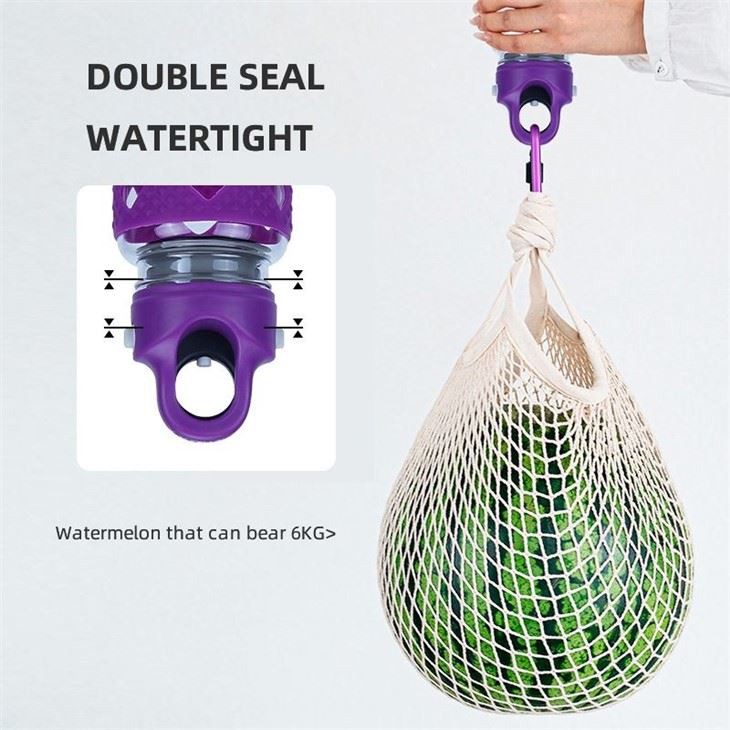Are there any health risks associated with glass water bottles?
As a supplier of glass water bottles, I often encounter questions from customers regarding the potential health risks associated with using glass water bottles. In this blog, I will delve into this topic, exploring both the safety aspects and the rare potential concerns related to glass water bottles.
First and foremost, glass is widely recognized as one of the safest materials for storing drinking water. Unlike some plastic or metal containers, glass is inert, which means it does not react with water or leach harmful chemicals into the liquid. This characteristic makes glass an ideal choice for those who are health - conscious and concerned about the quality of the water they consume.
Glass is made primarily from silica sand, soda ash, and limestone, which are natural and abundant materials. During the manufacturing process, these raw materials are melted at high temperatures to form a solid and stable structure. Once the glass is formed, it has a very low solubility in water, so there is minimal risk of any substances from the glass getting into the water.
One of the key advantages of glass water bottles in terms of health is that they do not harbor bacteria as easily as some other materials. Glass has a smooth surface that is non - porous, making it difficult for bacteria to attach and grow. This is especially important when it comes to reusable water bottles, as proper hygiene is crucial to prevent the spread of illness. Regular cleaning of a glass water bottle with soap and water can effectively keep it free from harmful microorganisms.
Moreover, glass does not absorb odors or flavors from the water or other beverages stored in it. This means that you can enjoy the pure taste of your water without any unwanted aftertastes or smells that might be transferred from previous uses. Whether you prefer plain water, flavored water, or other drinks like tea or juice, a glass water bottle will preserve the integrity of the taste.
However, it is important to mention a few rare scenarios where there could potentially be some health - related issues with glass water bottles. One concern is the risk of breakage. If a glass water bottle shatters, there is a danger of cuts and injuries from the broken glass. To address this issue, we offer Unbreakable Glass Water Bottle, which is designed with special technology to be more resistant to breakage. These bottles are typically made with a layer of protective material around the glass, reducing the likelihood of shattering even when dropped or bumped.


Another aspect to consider is the quality of the glass itself. In rare cases, if the glass is contaminated during the manufacturing process with heavy metals such as lead or cadmium, there could be a risk of these substances leaching into the water. But in reputable manufacturing facilities, strict quality control measures are in place to ensure that the glass meets safety standards. As a responsible supplier, we source our glass from trusted manufacturers who adhere to strict regulations regarding the use of materials and the production process.
In addition, some people might have concerns about the thermal shock of glass. If a glass water bottle is exposed to extreme temperature changes, for example, going from very cold to very hot suddenly, it could potentially crack. This is not a common occurrence, but it is something to be aware of. To avoid this, it is advisable not to subject the glass water bottle to rapid temperature changes.
Now, let's talk about the different types of glass water bottles we offer and their health - related benefits. Our 473ml Direct Drinking Glass Water Bottle is a popular choice for those who are on the go. Its convenient size allows you to carry an adequate amount of water with you throughout the day, ensuring proper hydration. The direct - drinking design also minimizes the contact between the water and external contaminants, further promoting good health.
We also have Lemon Glass Drinking Bottle, which is specifically designed for infusing water with fruits like lemons. The glass material ensures that the vitamin C and other beneficial compounds from the lemon are not affected by any chemical reactions with the container. This type of bottle allows you to enjoy the health benefits of lemon - infused water while keeping your drink fresh and pure.
In conclusion, the overall health risks associated with glass water bottles are minimal compared to the many benefits they offer. Glass is a safe, hygienic, and taste - preserving material for storing drinking water. At our company, we are committed to providing high - quality glass water bottles that meet the highest safety standards. If you are interested in purchasing our glass water bottles for personal use, in bulk for your business, or for any other purpose, we encourage you to contact us for procurement and negotiation. We are more than happy to discuss your specific needs and provide you with the best solutions.
References
- American Water Works Association. "Best Practices for Reusable Water Bottle Hygiene."
- Food and Drug Administration. "Safety Standards for Food - Contact Materials."
- World Health Organization. "Guidelines for Drinking - Water Quality."


